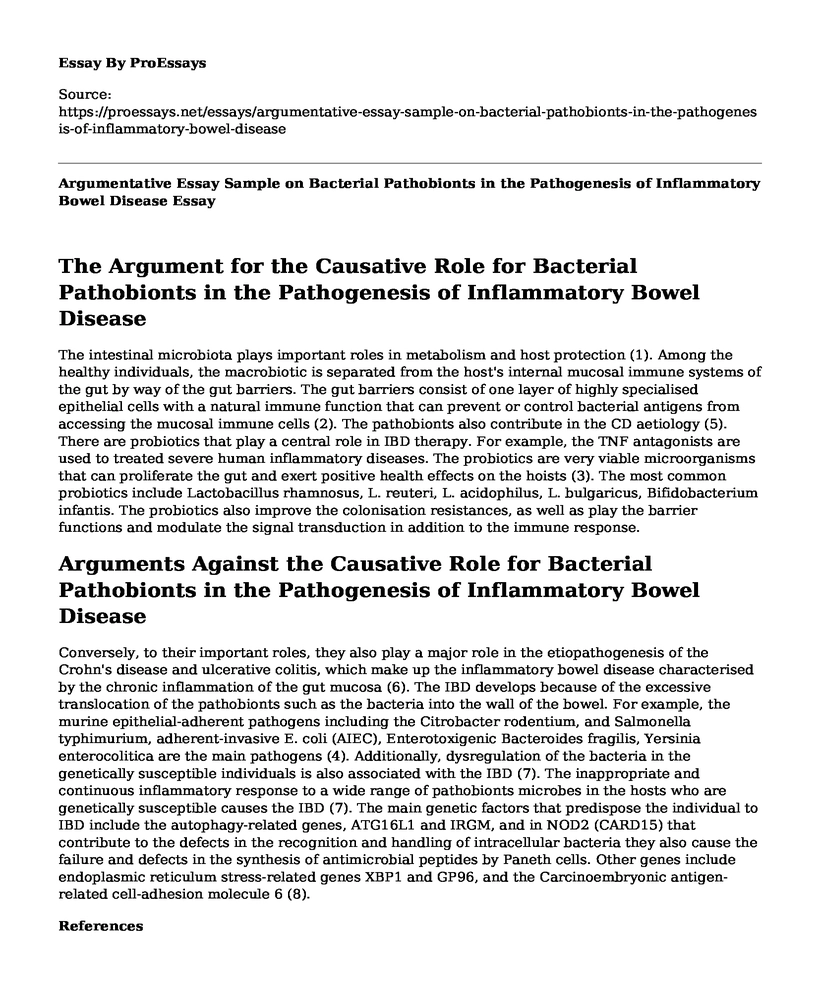The Argument for the Causative Role for Bacterial Pathobionts in the Pathogenesis of Inflammatory Bowel Disease
The intestinal microbiota plays important roles in metabolism and host protection (1). Among the healthy individuals, the macrobiotic is separated from the host's internal mucosal immune systems of the gut by way of the gut barriers. The gut barriers consist of one layer of highly specialised epithelial cells with a natural immune function that can prevent or control bacterial antigens from accessing the mucosal immune cells (2). The pathobionts also contribute in the CD aetiology (5). There are probiotics that play a central role in IBD therapy. For example, the TNF antagonists are used to treated severe human inflammatory diseases. The probiotics are very viable microorganisms that can proliferate the gut and exert positive health effects on the hoists (3). The most common probiotics include Lactobacillus rhamnosus, L. reuteri, L. acidophilus, L. bulgaricus, Bifidobacterium infantis. The probiotics also improve the colonisation resistances, as well as play the barrier functions and modulate the signal transduction in addition to the immune response.
Arguments Against the Causative Role for Bacterial Pathobionts in the Pathogenesis of Inflammatory Bowel Disease
Conversely, to their important roles, they also play a major role in the etiopathogenesis of the Crohn's disease and ulcerative colitis, which make up the inflammatory bowel disease characterised by the chronic inflammation of the gut mucosa (6). The IBD develops because of the excessive translocation of the pathobionts such as the bacteria into the wall of the bowel. For example, the murine epithelial-adherent pathogens including the Citrobacter rodentium, and Salmonella typhimurium, adherent-invasive E. coli (AIEC), Enterotoxigenic Bacteroides fragilis, Yersinia enterocolitica are the main pathogens (4). Additionally, dysregulation of the bacteria in the genetically susceptible individuals is also associated with the IBD (7). The inappropriate and continuous inflammatory response to a wide range of pathobionts microbes in the hosts who are genetically susceptible causes the IBD (7). The main genetic factors that predispose the individual to IBD include the autophagy-related genes, ATG16L1 and IRGM, and in NOD2 (CARD15) that contribute to the defects in the recognition and handling of intracellular bacteria they also cause the failure and defects in the synthesis of antimicrobial peptides by Paneth cells. Other genes include endoplasmic reticulum stress-related genes XBP1 and GP96, and the Carcinoembryonic antigen-related cell-adhesion molecule 6 (8).
References
1. Dalal S, Chang E. The microbial basis of inflammatory bowel diseases. Journal of Clinical Investigation. 2014;124(10):4190-4196.
2. Lane E, Zisman T, Suskind D. The microbiota in inflammatory bowel disease: current and therapeutic insights. Journal of Inflammation Research. 2017;Volume 10:63-73.
3. Hold G. Role of the gut microbiota in inflammatory bowel disease pathogenesis: What have we learnt in the past 10 years?. World Journal of Gastroenterology. 2014;20(5):1192.
4. Zechner E. Inflammatory disease caused by intestinal pathobionts. Current Opinion in Microbiology. 2017;35:64-69.
5. Ma H, Yu T, Zhao X, Zhang Y, Zhang H. Fecal microbial dysbiosis in Chinese patients with inflammatory bowel disease. World Journal of Gastroenterology. 2018;24(13):1464-1477.
6. Schippa S, Iebba V, Totino V, Santangelo F, Lepanto M, Alessandri C et al. A potential role of Escherichia coli pathobionts in the pathogenesis of pediatric inflammatory bowel disease. Canadian Journal of Microbiology. 2012;58(4):426-432.
7. Denizot J. Importance of Bacteria as Trigger in Inflammatory Bowel Disease. Journal of Gastrointestinal & Digestive System. 2012;01(S8).
8. Alhagamhmad M, Day A, Lemberg D, Leach S. An overview of the bacterial contribution to Crohn disease pathogenesis. Journal of Medical Microbiology. 2016;65(10):1049-1059.
Cite this page
Argumentative Essay Sample on Bacterial Pathobionts in the Pathogenesis of Inflammatory Bowel Disease. (2022, Nov 05). Retrieved from https://proessays.net/essays/argumentative-essay-sample-on-bacterial-pathobionts-in-the-pathogenesis-of-inflammatory-bowel-disease
If you are the original author of this essay and no longer wish to have it published on the ProEssays website, please click below to request its removal:
- Nursing Of the Future Safety - Research Paper
- CDC Biosurveillance System Paper Example
- Essay Sample on Rubella/German Measles
- Anti-Smoking Campaign Advert Analysis
- Essay on Community Health Education Plan: Reduce Sugar Consumption & Enhance Healthy Eating
- Paper Sample on Tuberculosis: A Global Health Crisis
- Navigating Digital Transformation in Higher Education: Priorities in Language Learning During the Pandemic







